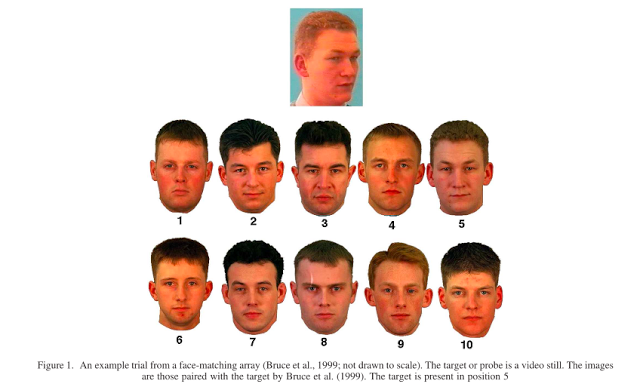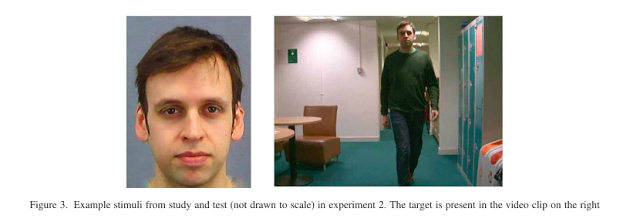Neuroscience
It's only within the last 10 years that psychologists have realised some people have extremely good face recognition abilities that set them apart from the rest of the population, a group they call "super recognisers". These individuals excel on established lab tests of their abilities, such as the Cambridge Face Memory Test. Understandably, this has led to interest in using these people's skills in real-life settings, such as to help identify rioters whose faces have been captured on CCTV. In fact, there are reports that the Metropolitan Police in London already have a team of super-recognisers for just such purposes.
A new study published in Applied Cognitive Psychology is helping psychological science catch up with these developments. Anna Bobak and her colleagues have tested seven super recognisers (already known to their lab) on two tasks to see if their excellent lab performance translates to more practical uses.
The first test involved the super recognisers (and a group of 22 student control participants) looking at a still image of an unfamiliar face captured on CCTV and then picking out this individual from an array of ten more photographs of faces (shown from a different angle, and taken with a different camera; see figure below). This process was repeated 80 times, and the target was present in the array of ten on half of these trials. In real life, something like this situation can occur if a criminal is recorded on CCTV, suspects are later arrested, and police must decide if any of the suspects are the person seen on CCTV.

Most people are known to find this task tricky. However, the super recognisers' performance was remarkable – they correctly identified the target face on more than 93 per cent of trials, compared with an average hit rate of just over 80 per cent among the controls. The super recognisers were also more confident in their answers and made fewer false identifications. Looking at individual rather than group performance, four of the seven super recognisers significantly outperformed the controls.
The second test involved the super recognisers and controls studying CCTV stills of twenty faces and imagining that these people were missing or wanted. Then they performed a distracting filler task (involving searching for letters). Then they watched 40 five-second video clips, each of which depicted a person walking down a dimly lit corridor. For each clip, the participants had to say whether they recognised the person or not (as being among the twenty faces they'd looked at earlier). This is like a police officer memorising wanted or missing posters and then looking out for these people when out on the street.

The super recognisers struggled at this task, but they still outperformed the controls by some way. The groups' average accuracy rates were 67 per cent and and 58 per cent, respectively. Another insight from this and the first task, was that while the participants' performance correlated with their success on the Cambridge Face Memory Test at a group level, there were some anomalies at the individual level. For example, one of the super recognisers who aced the standard Cambridge Test failed to outperform controls on the two life-like tests used in this study. The researchers concluded that super recognisers could be a real boon to real-life security agencies, but that recruiters would do well to use a mix of established lab-based and more applied tests to find the best candidates for performing real-life identification tasks.
_________________________________
Bobak, A., Hancock, P., & Bate, S. (2015). Super-recognisers in Action: Evidence from Face-matching and Face Memory Tasks Applied Cognitive Psychology DOI: 10.1002/acp.3170
--further reading--
Meet a super recogniser
I never forget a face!
Post written by Christian Jarrett (@psych_writer) for the BPS Research Digest.
Figures from Bobak et al.
Our free fortnightly email will keep you up-to-date with all the psychology research we digest: Sign up!
- Super Week Round-up
We hope you enjoyed our Super Week special feature that ran all last week to complement the Super-themed special issue of The Psychologist magazine. Each day we met a person with an extreme ability or a researcher investigating such an ability. Here's...
- Welcome To Digest Super Week!
Think of super powers and most of us are influenced by the comic book super-heroes - the strength and flight of Superman or the web-slinging skills of Peter Parker. But super powers don't exist only in fiction. Back in reality, there are people with...
- Feast
Our round-up of the latest psychology links from around the web: Tips from psychologists on how to maintain focus at work (New York Times). Don't worry, reading the Digest blog definitely counts as work. Facebook users average just 3.74 degrees of...
- Face-recognition Problems More Common Than Previously Thought
Problems recognising faces, brought on by brain injury, could be more prevalent than previously thought. That’s according to Tim Valentine and colleagues who argue there’s been an over-reliance on ‘pure’ cases, and that “it is easy to dismiss...
- Neuropsychology Abstract Of The Day: Visuocognition
The Cambridge Car Memory Test: A task matched in format to the Cambridge Face Memory Test, with norms, reliability, sex differences, dissociations from face memory, and expertise effects Behav Res Methods. 2011 Oct 20; Dennett HW, McKone E, Tavashmi R,...
Neuroscience
"Super recognisers": more than just clever lab rats
It's only within the last 10 years that psychologists have realised some people have extremely good face recognition abilities that set them apart from the rest of the population, a group they call "super recognisers". These individuals excel on established lab tests of their abilities, such as the Cambridge Face Memory Test. Understandably, this has led to interest in using these people's skills in real-life settings, such as to help identify rioters whose faces have been captured on CCTV. In fact, there are reports that the Metropolitan Police in London already have a team of super-recognisers for just such purposes.
A new study published in Applied Cognitive Psychology is helping psychological science catch up with these developments. Anna Bobak and her colleagues have tested seven super recognisers (already known to their lab) on two tasks to see if their excellent lab performance translates to more practical uses.
The first test involved the super recognisers (and a group of 22 student control participants) looking at a still image of an unfamiliar face captured on CCTV and then picking out this individual from an array of ten more photographs of faces (shown from a different angle, and taken with a different camera; see figure below). This process was repeated 80 times, and the target was present in the array of ten on half of these trials. In real life, something like this situation can occur if a criminal is recorded on CCTV, suspects are later arrested, and police must decide if any of the suspects are the person seen on CCTV.

Most people are known to find this task tricky. However, the super recognisers' performance was remarkable – they correctly identified the target face on more than 93 per cent of trials, compared with an average hit rate of just over 80 per cent among the controls. The super recognisers were also more confident in their answers and made fewer false identifications. Looking at individual rather than group performance, four of the seven super recognisers significantly outperformed the controls.
The second test involved the super recognisers and controls studying CCTV stills of twenty faces and imagining that these people were missing or wanted. Then they performed a distracting filler task (involving searching for letters). Then they watched 40 five-second video clips, each of which depicted a person walking down a dimly lit corridor. For each clip, the participants had to say whether they recognised the person or not (as being among the twenty faces they'd looked at earlier). This is like a police officer memorising wanted or missing posters and then looking out for these people when out on the street.

The super recognisers struggled at this task, but they still outperformed the controls by some way. The groups' average accuracy rates were 67 per cent and and 58 per cent, respectively. Another insight from this and the first task, was that while the participants' performance correlated with their success on the Cambridge Face Memory Test at a group level, there were some anomalies at the individual level. For example, one of the super recognisers who aced the standard Cambridge Test failed to outperform controls on the two life-like tests used in this study. The researchers concluded that super recognisers could be a real boon to real-life security agencies, but that recruiters would do well to use a mix of established lab-based and more applied tests to find the best candidates for performing real-life identification tasks.
_________________________________

Bobak, A., Hancock, P., & Bate, S. (2015). Super-recognisers in Action: Evidence from Face-matching and Face Memory Tasks Applied Cognitive Psychology DOI: 10.1002/acp.3170
--further reading--
Meet a super recogniser
I never forget a face!
Post written by Christian Jarrett (@psych_writer) for the BPS Research Digest.
Figures from Bobak et al.
Our free fortnightly email will keep you up-to-date with all the psychology research we digest: Sign up!
- Super Week Round-up
We hope you enjoyed our Super Week special feature that ran all last week to complement the Super-themed special issue of The Psychologist magazine. Each day we met a person with an extreme ability or a researcher investigating such an ability. Here's...
- Welcome To Digest Super Week!
Think of super powers and most of us are influenced by the comic book super-heroes - the strength and flight of Superman or the web-slinging skills of Peter Parker. But super powers don't exist only in fiction. Back in reality, there are people with...
- Feast
Our round-up of the latest psychology links from around the web: Tips from psychologists on how to maintain focus at work (New York Times). Don't worry, reading the Digest blog definitely counts as work. Facebook users average just 3.74 degrees of...
- Face-recognition Problems More Common Than Previously Thought
Problems recognising faces, brought on by brain injury, could be more prevalent than previously thought. That’s according to Tim Valentine and colleagues who argue there’s been an over-reliance on ‘pure’ cases, and that “it is easy to dismiss...
- Neuropsychology Abstract Of The Day: Visuocognition
The Cambridge Car Memory Test: A task matched in format to the Cambridge Face Memory Test, with norms, reliability, sex differences, dissociations from face memory, and expertise effects Behav Res Methods. 2011 Oct 20; Dennett HW, McKone E, Tavashmi R,...
